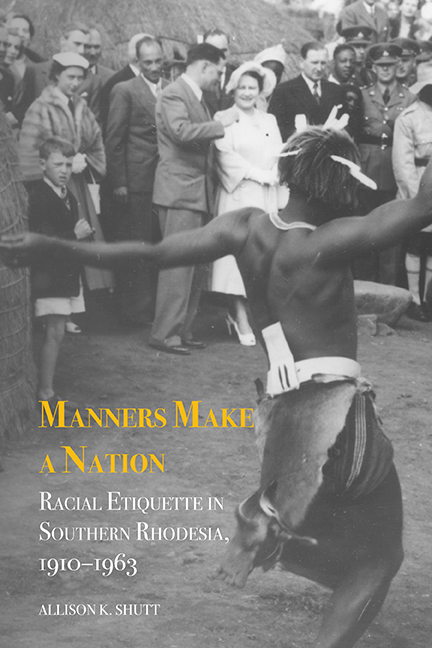1 - Insolence and Respect
Published online by Cambridge University Press: 04 June 2021
Summary
A central aim of the Southern Rhodesian government was to mold Africans into deferential, obedient peoples with an internal sense of proper etiquette toward whites. Very quickly, the broad outlines of racial etiquette in Southern Rhodesia became clear—Africans should defer to whites without question—but despite outward appearances and regardless of whites’ common desire to write Africans out of the landscape and so out of their minds, Africans intruded into white life at every turn. Whites called this “insolence.” The fact is that many whites could not play the role of a practiced and assured ruler. For the white official, the charge of insolence or contemptuous behavior was handy in this regard: badly behaved Africans became the reason for the brief rupture of authority and cloaked the actions of violent, incompetent, cruel, and nervous officials as civilized and legal. As such, insolence cases provide a rich archive of the exercise of power and also highlight the elusiveness of law-bound governance in Southern Rhodesia and the significance of codifying subjective impressions of African behavior as legal and honorable.
This chapter provides a broad chronological survey of changes in the way government officials identified and defined insolence and contemptuous behavior from the beginning of the 1927 Native Affairs Act, which criminalized insolence, to the end of the 1950s, when new legislation replaced the by-then embarrassing Native Affairs Act and shifted legal authority over insolent Africans away from the Native (renamed African) Affairs Department. Over almost three decades of legal history the government of Southern Rhodesia tried to define the behavior and attitudes that were subversive to authority, beginning with legislation meant to make insolence toward government officials illegal. But a persistent problem that dogged any such legislation was that, too often, officials’ interpretation of insolence or contemptuous behavior was a subjective observation, not a point of legal interpretation. In the 1920s through the 1940s, Native Affairs Department officials demanded the authority to charge Africans with insolence because they said the lack of such legal ability lowered their prestige and so their standing among Africans.
- Type
- Chapter
- Information
- Manners Make a NationRacial Etiquette in Southern Rhodesia, 1910–1963, pp. 21 - 50Publisher: Boydell & BrewerPrint publication year: 2015

